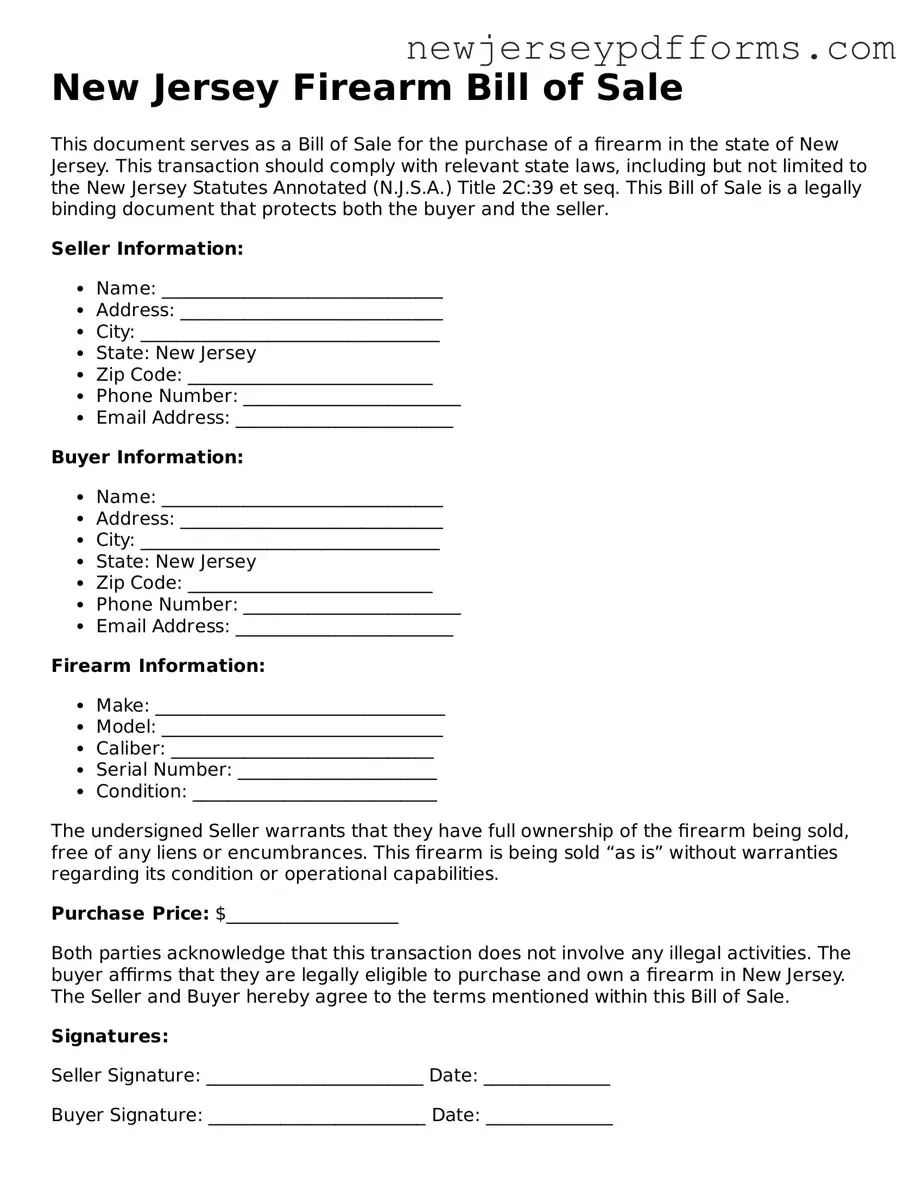What is a Firearm Bill of Sale in New Jersey?
A Firearm Bill of Sale is a legal document that records the transfer of ownership of a firearm from one individual to another. In New Jersey, this form is crucial for ensuring that both the seller and buyer have a clear understanding of the transaction. It serves as proof of ownership and can be essential for legal purposes, such as background checks or in the event of a dispute.
Is a Firearm Bill of Sale required in New Jersey?
While New Jersey does not legally require a Bill of Sale for the transfer of firearms, it is highly recommended. Having this document can protect both parties involved in the transaction. It provides a written record of the sale, which can be beneficial if there are questions about ownership or legality in the future.
What information should be included in a Firearm Bill of Sale?
A comprehensive Firearm Bill of Sale should include several key pieces of information. This includes the names and addresses of both the seller and the buyer, the make, model, and serial number of the firearm, the date of the transaction, and the sale price. Additionally, both parties should sign the document to confirm their agreement to the sale.
Can I use a Firearm Bill of Sale from another state?
Using a Firearm Bill of Sale from another state may not be advisable. Each state has different laws and requirements regarding firearm transactions. It is best to use a form that is specifically tailored to New Jersey’s regulations to ensure compliance with local laws and to protect both parties in the transaction.
What if the buyer is not a resident of New Jersey?
If the buyer is not a resident of New Jersey, the sale may be subject to federal laws and the laws of the buyer's home state. In such cases, it is essential to understand both New Jersey's laws and those applicable in the buyer's state. Consulting with legal counsel may be beneficial to navigate these complexities and ensure a lawful transaction.
How do I ensure that the buyer is legally allowed to purchase a firearm?
To verify that a buyer is legally allowed to purchase a firearm, you should conduct a background check. In New Jersey, this typically involves ensuring that the buyer has obtained a Firearms Purchaser Identification Card (FPIC) or a Permit to Purchase a Handgun. These documents indicate that the buyer has passed the necessary background checks and meets the legal requirements to own a firearm.
What should I do if I sell a firearm and it is later used in a crime?
If a firearm you sold is later involved in a crime, having a Bill of Sale can protect you. This document serves as evidence that you no longer own the firearm and can help establish that you were not responsible for its use. It is advisable to keep a copy of the Bill of Sale for your records, along with any relevant communication regarding the sale.
Are there any penalties for not using a Bill of Sale?
While there may not be specific penalties for failing to use a Bill of Sale in New Jersey, not having one can lead to complications. Without documentation, proving ownership or the legality of a transaction may become difficult. This lack of clarity can result in legal issues or disputes, which could have been avoided with proper documentation.
Where can I obtain a Firearm Bill of Sale form?
You can find a Firearm Bill of Sale form through various online resources, legal document providers, or firearm advocacy organizations. It is important to ensure that any form you use complies with New Jersey laws. Additionally, consulting with a legal expert can help ensure that the form meets all necessary requirements for your specific transaction.

